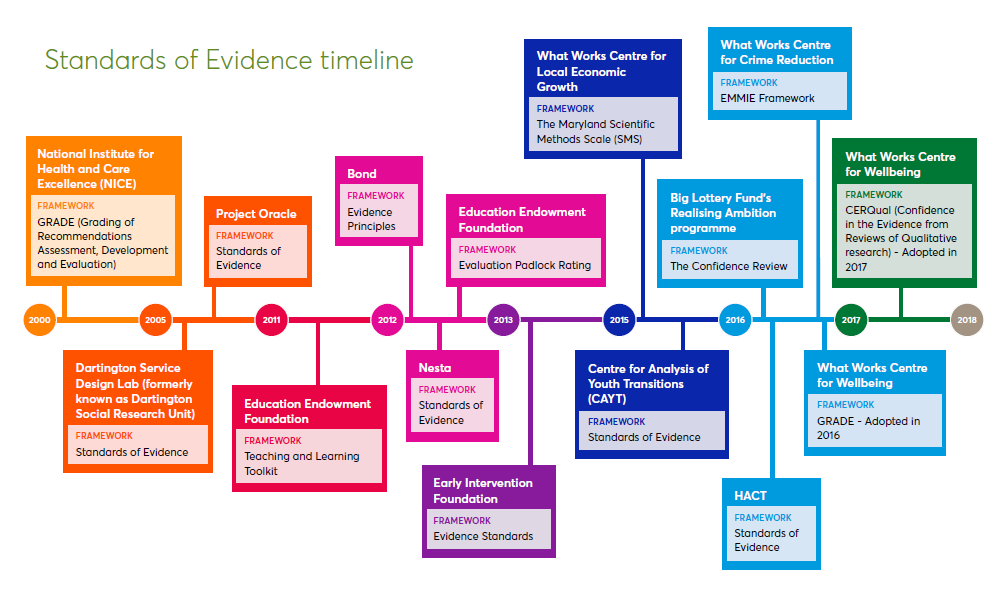
Image: Nesta (CC-BY-NC-SA)
What is good evidence? And how can policymakers and decisionmakers decide what is working and what isn’t, when it comes to deciding where public money is spent and how?
These are the kinds of questions that models and tools such as randomised controlled trials and cost-benefit analysis attempt to answer. The government has also supported the development over the last five years of the What Works Network, which now consists of 10 independent What Works Centres. When talking about impact there’s also been a move to capturing and recognising the value of qualitative data.
As one of our key aims is to support and facilitate the sharing and use of evidence in the public sector, we were interested to read a new publication ‘Mapping the standards of evidence used in UK social policy’.
Standards of evidence
Produced by the Alliance for Useful Evidence, the research has found 18 different Standards of Evidence currently in use across UK social policy.
The report notes that over the last decade there has been increasing interest in grading effectiveness or impact against a level or scale. Typically, the higher up the scale, the more evidence is available. Theoretically this means that decision-makers can have higher confidence in deciding whether a policy or intervention is working.
While all the evidence frameworks generally aim to improve the use of evidence, the different goals of the organisations responsible can shape the frameworks in different ways. They can be used to inform funding decisions, to make recommendations to the wider sector about what works and what doesn’t, or as a resource to help providers to evaluate. And unfortunately this means that the same intervention can be assessed differently depending on which framework is used.
The Alliance for Useful Evidence concludes that while a focus on evidence use is positive, the diversity of evidence standards risks creating confusion. Suggested options for improving the situation include introducing an independent accreditation system, or having a one-stop shop which would make it easier to compare ratings of interventions.
Dissemination and wider engagement
The question of standardising evidence frameworks is just one part of a wider effort to increase transparency. As well as collecting evidence, it’s important that when public money has been invested in carrying out evaluations and impact assessments, that this evidence remain accessible over the longer term and that lessons are learned. It can often seem that government departments have very short organisational memories – especially if they’ve suffered a high churn of staff.
Two projects which we support in Scotland are focused on increasing the dissemination and awareness of evaluation and research evidence. Research Online is Scotland’s labour market information hub. Produced by ourselves and Skills Development Scotland, the portal brings together a range of statistics and research and acts as the centre of a community of practice for labour market researchers, practitioners and policy-makers.
Meanwhile Evaluations Online is a publicly accessible collection of evaluation and research reports from Scottish Enterprise. The reports cover all aspects of Scottish Enterprise’s economic development activities – some of the latest added to the site cover megatrends affecting Scottish tourism, innovation systems and the gender gap, and the commercial flower-growing sector in Scotland.
When working within the policy world it can be easy to suffer from fatigue as ideas appear to be continually recycled, rejected and then revisited as policy fashions change and political parties or factions go in and out of power. The spotlight, often driven by the media, will shine on one hot policy issue – for example, moped crime, cannabis legislation or health spending – and then move on.
Online libraries of evaluations and research reports are one tool which can help support a longer-term culture of learning and improvement within the public sector.
Evidence Week 2018
Inspired by similar objectives, Evidence Week runs from 25th to 28th June 2018 and aims to explore the work of parliamentarians in seeking and scrutinising evidence. It will bring together MPs, peers, parliamentary services and the public to talk about why evidence matters, and how to use and improve research evidence.
This may be the start of wider knowledge sharing about standards of evidence, to help those using them to improve their practice.
The Knowledge Exchange is a member of the Alliance for Useful Evidence. Our databases are used by government and the public sector, as well as private-sector consultancies, to keep abreast of policy news and research in social and public policy.
- Introducing the Idox Information Service … supporting evidence use for over 40 years
- Why a holistic approach to public health and social care needs a wider evidence base … and how Social Policy and Practice can help
- Implementation science: why using evidence doesn’t guarantee success
- Q&A with Mark Evans: “To make evidence effective you have to win the war of ideas”
- Who’s who in the UK’s evidence landscape
Share
Related Posts
Tackling geographical inequalities is critical for ensuring that all parts of the country have the potential to prosper. When the UK was a member of the European Union, it was entitled to a share of funding from the EU’s structural ....
In recent years, there has been an increasing focus on ensuring people with ‘lived experience’ are involved in co-producing research and policy-making at practical, local level. However, there has been little discussion around what the people with lived experience themselves ....
By Robert Kelk and Chris Drake A new start for an old challenge? The recent appointment of Marc Lemaître as the European Commission’s director general for research and innovation (R&I) has returned Europe’s R&I gap to the spotlight. Previously head ....
Today sees the start of Community Garden Week 2023. Across the UK, communities will be celebrating the many and varied types of community gardens, from children’s and neighbourhood gardens to therapy gardens and allotments. The benefits of community gardens are ....
